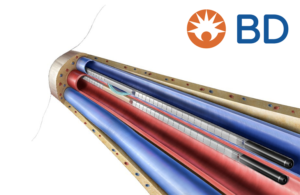 BD (NYSE: BDX) recently announced that it has begun enrollment for its post-market surveillance study of its WavelinQ arteriovenous endovascular fistula device.
BD (NYSE: BDX) recently announced that it has begun enrollment for its post-market surveillance study of its WavelinQ arteriovenous endovascular fistula device.
The Connect-AV trial is a prospective, single-arm, open-label study that will follow WavelinQ EndoAVF system patients for 24 months. Its dual primary effectiveness endpoints are the percentage of subjects dialyzing with successful 2-needle cannulation for at least 75% of dialysis sessions over a 28-day period, and subjects who are maintaining primary patency at six months. The primary safety endpoint is freedom from the device and procedure-related serious adverse events for 30 days.
“For more than 50 years, medicine has looked for a next-generation hemodialysis access procedure for patients with ESKD that can truly change the treatment paradigm,” Brandon Repko, medical director of nuclear imaging and therapeutic services at Butler Memorial Hospital in Butler, Penn., said in a news release. “The Connect-AV trial is the next step in proving WavelinQ EndoAVF System’s role in 21st century AV fistula creation. My colleagues and I are thrilled to be a part of that patient care evolution.”
WavelinQ EndoAVF is indicated to create an arteriovenous fistula using concomitant ulnar artery and ulnar vein in hemodialysis patients with minimum artery and vein diameters of 2.0 mm at the fistula creation site.
The Connect-AV study is BD’s second post-market study of the device. The other study, Wave-Global, is a prospective, single-arm, open-label study that will follow patients treated with the WavelinQ system for 24 months.
“Physicians already have real-world experience using the WavelinQ EndoAVF System to create AV fistulas that make life-preserving hemodialysis possible,” Panagiotis Kitrou, assistant professor of interventional radiology at Patras University Hospital in Greece, said. “Both of these studies will provide important long-term data on the safety and effectiveness of WavelinQ EndoAVF System to help make informed decisions about patient care.”
